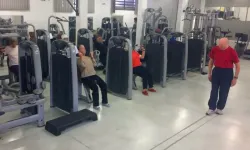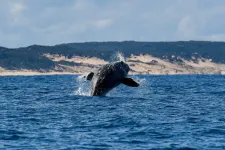(Press-News.org) What are humans? What are animals? And what makes humans unique? The comparative psychologist Fumihiro Kano has set himself a life goal to answer those questions. On 28 February 2023 it was announced that the scientist from the Cluster of Excellence “Centre for the Advanced Study of Collective Behaviour” (CASCB) at the University of Konstanz will receive the Manfred Fuchs Prize from the Heidelberg Academy of Sciences and Humanities of the State Baden-Württemberg for his interdisciplinary work in animal behaviour research.
Photo gallery for the article: https://www.campus.uni-konstanz.de/en/science/the-map-to-human-behaviour
Fumihiro Kano wears a motion capture suit, eye tracking glasses, and holds a table tennis racket with markers in his hand. “I am interested in what animals see, feel, and think, and ultimately how humans, as one of the primate species, are unique in perception, cognition, and social behaviour,” he says and then starts to play table tennis in his lab. Fumihiro Kano has been a group leader at the CASCB since 2021. He started his career at Kyoto University and was enrolled at the Max Planck Institute for Evolutionary Anthropology and at the University of Oxford before coming to Konstanz. He describes himself not a passionate table tennis player, but the Japanese researcher thinks that everyone is able to play the sport. That is the reason he chose table tennis for an experiment.
How groups interact
Together with his Postdoctoral Researcher Prasetia Putra, Kano conducts a study where they want to unravel the underlying mechanism of human coordination in sports using behavioural and physiological modalities. “Sometimes groups coordinate nicely, sometimes they fail, but what is the secret behind it?” asks Kano. “So far, the individuals’ anticipation ability, movement coordination, and physiological difference is unknown,” he says.
Therefore, this study aims to fill those gaps by measuring an individual’s gaze direction, body movements, and heartbeat. Participants play table tennis in teams of two while wearing a motion capture suit as Kano does. Even the table tennis ball is marked. A motion caption camera system tracks the movements.
The focus is on micro behaviour
Overall, Fumihiro Kano concentrates on micro behaviour to map human and animal behaviour. His research species include birds, primates, and human adults. They target various collective behaviour, including team cooperation, vigilance, and collective foraging. “Basically, I just bring non-inversive cutting edge technologies to the field,” he says.
In another experiment, he focuses on group performances in pigeons, “a very social bird species,” as he says. While pigeons forage, they want to eat as much as possible. Nevertheless, they need to be attentive collectively, to be aware when a predator attacks them. “In our experiment, my PhD student Mathilde Delacoux and I created a situation where the pigeons see warning cue and we tried to find out the group performance during the pretended attack.”
Thanks to modern tracking technology, the research group knows precisely where each individual is looking at and if the individual has the head up or down while the pretended predator calls. The researchers conduct the experiment in the Imaging Barn, a collaborative project between the CASCB and the Max Planck Institute of Animal Behavior. It is a core facility for studying the dynamics of highly naturalistic interactions. Both experiments are still running, so they themselves are still curious about the results.
“In a highly creative way, Fumihiro Kano uses and extends state-of-the-art informatics methods as tracking and modelling to study cognition and behaviour of humans and different animal species, from birds to monkeys, from individuals to groups of humans and animals,” Oliver Deussen, speaker of the CASCB mentions.
Key facts
Fumihiro Kano will be awarded the Manfred Fuchs Prize of the Heidelberg Academy of Sciences and Humanities for his interdisciplinary work in animal behaviour research.
He is a group leader at the Cluster of Excellence “Centre for the Advanced Study of Collective Behaviour” (CASCB) at the University of Konstanz.
Fumihiro Kano is interested in what animals see, feel, and think, and ultimately how humans, as one of the primate species, are unique in perception, cognition, and social behaviour.
Note to editors:
Photos can be downloaded here:
1) https://www.uni-konstanz.de/fileadmin/pi/fileserver/2023_EXSTRA/der_schluessel_1.jpg
2) https://www.uni-konstanz.de/fileadmin/pi/fileserver/2023_EXSTRA/der_schluessel_2.jpg
Caption: Table tennis experiment with Fumihiro Kano. For tracking his movements, he wears a motion-capture suit, eye-tracking glasses and holds a table tennis bat with marker dots in his hand.
Copyright: Elisabeth Böker, CASCB, University of Konstanz
.
END
The map to human and animal behavior
Manfred Fuchs Prize for Fumihiro Kano’s animal behavior research
2023-03-02
ELSE PRESS RELEASES FROM THIS DATE:
Resistance training improves sleep quality and reduces inflammation in older people with sarcopenia
2023-03-02
Sarcopenia is the decline of skeletal muscle mass with age, leading to loss of muscle strength (to move objects, shake hands etc.) and performance (walking and making other routine movements effectively). It involves chronic inflammation and is associated with cognitive alterations, heart disease and respiratory disorders. In short, it affects the quality of life, reducing independence and increasing the risk of injury, falls and even death.
Sarcopenia affects 15% of adults over the age of 60 and 46% of those over 80. Sleep disorders are also common in these age groups. The aging ...
Bald eagles aren’t fledging as many chicks due to avian influenza
2023-03-02
Bald eagles are often touted as a massive conservation success story due to their rebound from near extinction in the 1960s.
But now a highly infectious virus may put that hard-fought comeback in jeopardy.
Published in Nature’s Scientific Reports, new research from the University of Georgia showed highly pathogenic avian influenza, also known as H5N1, is killing off unprecedented numbers of mating pairs of bald eagles.
“Even just one year of losses of productivity like we’ve documented regionally is very concerning and could have effects for decades to come if representative of broader regions,” said ...
New podcast gives parents a “Pediatrician Next Door”
2023-03-02
Imagine if harried parents could get the scientific and clinical expertise of a pediatrician just by walking only a few steps next door. That’s the premise of a new podcast, The Pediatrician Next Door, by Dr. Wendy Hunter, M.D. She brings decades of experience in emergency and primary pediatric care to answer burning questions that parents are reluctant to ask.
“In the emergency room, I saw a great many frustrated parents and their kids who didn’t always get their questions answered by their pediatrician because there just wasn’t time in the clinic,” said Dr. Hunter. “Or, they didn’t have access to their ...
Existing chest scans offer new opportunities for predicting surgical risks
2023-03-02
Instead of special heart scans, physicians can use images of the chest captured months earlier, and for other reasons, to estimate patients’ risk of heart attack or death during several kinds of major surgeries, a new study shows.
Researchers at NYU Grossman School of Medicine analyzed existing computed tomography (CT) scans to estimate levels of hardened (calcified) fatty plaque deposits in the heart’s three largest blood vessels. They found that patients with greater buildup of this plaque had higher chances of developing serious health issues following surgery.
Major surgeries, which usually ...
Using radar to predict Alzheimer’s disease and fall accidents
2023-03-02
Researchers at Chalmers University of Technology in Sweden have developed a method for predicting fall accidents and cognitive illnesses such as Alzheimer’s disease by reading a person’s walking pattern with the aid of a radar sensor. The small sensor can be attached to furniture, walls and ceilings, both in the home and in a healthcare setting.
“Our method is both precise and easy to use. It can help healthcare staff to carry out a more reliable risk analysis and tailor interventions to achieve a significant effect early on. Hopefully it can ...
2023 GOLD Report proposes a new definition of chronic obstructive pulmonary disease
2023-03-02
New York, NY – March 02, 2023 – Despite COPD’s pervasiveness, it is generally assumed that the main instigator in its development is tobacco smoking. The 2023 Global Initiative for Chronic Obstructive Lung Disease or GOLD report is proposing a new definition of COPD, one that acknowledges the key pathogenic role of tobacco smoking but accounts for other factors that also contribute to COPD. The report is now available online in the American Journal of Respiratory and Critical Care Medicine.
The GOLD 2023 report ...
Physicians should screen youth for cyberbullying, social media use
2023-03-02
Most adolescents and young adults have experienced bullying in some form, with about one-third of them experiencing cyberbullying, contributing to mental health concerns. Cyberbullying involves electronic communication such as texts, emails, online videos and social media, which has become increasingly problematic over the last few decades. Several reasons include the anonymity it allows, the fact that it is not as easily monitored, and that adolescents and young adults have easier access to devices.
In an article published in the journal Primary Care Clinical ...
Skin samples reveal where southern right whales feed
2023-03-02
Scientists have analysed chemicals in the skin of southern right whales to give new insights into the animals’ distribution, as well as long-term environmental changes in the Southern Ocean.
The research was published this week in Proceedings of the National Academy of Sciences (PNAS). [https://www.pnas.org/doi/10.1073/pnas.2214035120]
The scientists from the US, Australia, Argentina, Brazil, South Africa, Europe, UK, and Aotearoa New Zealand measured the amounts of various carbon and nitrogen isotopes ...
Socioeconomic factors play a role in detection, transmission and treatment of HIV
2023-03-02
Those living in unstable housing conditions, such as hostels or informal dwellings and those who had not completed post-secondary studies were more likely to contract HIV in South Africa, according to a new study from McGill University. A team of researchers based at the Research Institute of the McGill University Health Centre (RI-MUHC) has reported survey results that show socioeconomic factors play a critical role in the detection, transmission, and treatment of HIV in regions of South Africa. “We found that factors such as education and dwelling situations still impact ...
U.S. birds’ Eastern, Western behavior patterns are polar opposites
2023-03-02
COLUMBUS, Ohio – There is much more to avian biodiversity in the United States than the number of different species living in a given region or community, but the diversity of birds’ ecosystem contributions – assessed through measures of their diet, body structure and foraging methods – are much tougher to study.
And with hundreds of species migrating south for the winter and north for summer breeding, birds’ ecosystem function patterns change over space and time – creating a serious analytical challenge.
But two scientists from The Ohio State University have ...
LAST 30 PRESS RELEASES:
Ketamine high NOT related to treatment success for people with alcohol problems, study finds
1 in 6 Medicare beneficiaries depend on telehealth for key medical care
Maps can encourage home radon testing in the right settings
Exploring the link between hearing loss and cognitive decline
Machine learning tool can predict serious transplant complications months earlier
Prevalence of over-the-counter and prescription medication use in the US
US child mental health care need, unmet needs, and difficulty accessing services
Incidental rotator cuff abnormalities on magnetic resonance imaging
Sensing local fibers in pancreatic tumors, cancer cells ‘choose’ to either grow or tolerate treatment
Barriers to mental health care leave many children behind, new data cautions
Cancer and inflammation: immunologic interplay, translational advances, and clinical strategies
Bioactive polyphenolic compounds and in vitro anti-degenerative property-based pharmacological propensities of some promising germplasms of Amaranthus hypochondriacus L.
AI-powered companionship: PolyU interfaculty scholar harnesses music and empathetic speech in robots to combat loneliness
Antarctica sits above Earth’s strongest “gravity hole.” Now we know how it got that way
Haircare products made with botanicals protects strands, adds shine
Enhanced pulmonary nodule detection and classification using artificial intelligence on LIDC-IDRI data
Using NBA, study finds that pay differences among top performers can erode cooperation
Korea University, Stanford University, and IESGA launch Water Sustainability Index to combat ESG greenwashing
Molecular glue discovery: large scale instead of lucky strike
Insulin resistance predictor highlights cancer connection
Explaining next-generation solar cells
Slippery ions create a smoother path to blue energy
Magnetic resonance imaging opens the door to better treatments for underdiagnosed atypical Parkinsonisms
National poll finds gaps in community preparedness for teen cardiac emergencies
One strategy to block both drug-resistant bacteria and influenza: new broad-spectrum infection prevention approach validated
Survey: 3 in 4 skip physical therapy homework, stunting progress
College students who spend hours on social media are more likely to be lonely – national US study
Evidence behind intermittent fasting for weight loss fails to match hype
How AI tools like DeepSeek are transforming emotional and mental health care of Chinese youth
Study finds link between sugary drinks and anxiety in young people
[Press-News.org] The map to human and animal behaviorManfred Fuchs Prize for Fumihiro Kano’s animal behavior research





